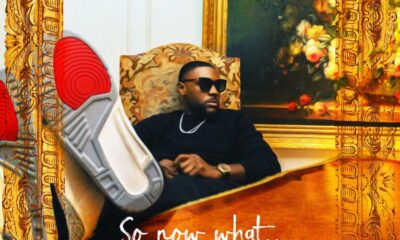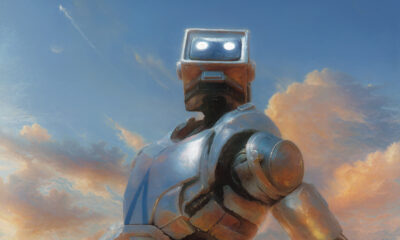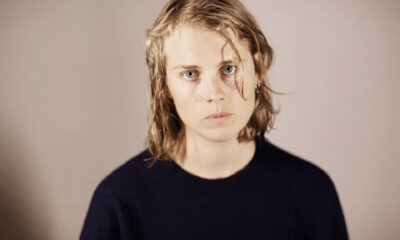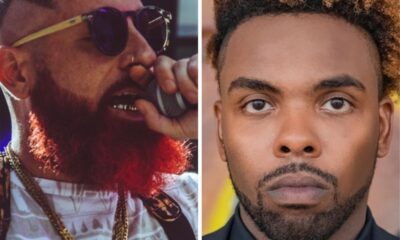Interviews
Interview with solo artist Noah Francis
He’s just really getting started and already Noah Francis has had quite the career. Not only is Noah becoming a very accomplished rock solo artist, but he’s also managed to excel in life at boxing and break dancing. From the UK, Noah’s music combines elements of rock and hip hop which is why he’s been referred to as “the urban rocker.” Raised in a musically oriented family, Noah grew up travelling on the road with his father where he was shown the ropes of what it takes to make it in the industry.
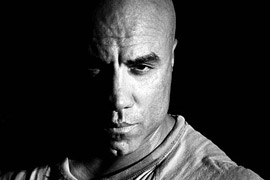
He’s just really getting started and already Noah Francis has had quite the career. Not only is Noah becoming a very accomplished rock solo artist, but he’s also managed to excel in life at boxing and break dancing. From the UK, Noah’s music combines elements of rock and hip hop which is why he’s been referred to as “the urban rocker.” Raised in a musically oriented family, Noah grew up travelling on the road with his father where he was shown the ropes of what it takes to make it in the industry. Prior to his blossoming solo career, Noah was the lead singer of the band Ellis and for a time was even a pop musician. His debut solo record Five Decades Below is due out this summer and it features a number of high profile producers and collaborators. Recently we spoke to Noah and tried to learn a little more about his fascinating life and new endeavour as a solo musician.
Tell us a little bit about your upbringing. You come from a family heavily involved in music. When did you first really get interested in becoming a musician?
Noah: I got involved in my head around when I was five years old knowing that that’s what I wanted to do, I just know it was probably earlier but I can’t remember, I can’t go back anymore. But five years old was a time when I remember being a kid and people saying “you were the kid that wanted to do music.” And then from there you know I just kept on because of my dad, he was in a band called The Chantels, I kept asking him to take me on the road and he finally gave in right around when I was about twelve years old. I did my first proper show at nine and then I went around the country with him, just getting up and singing. And rather than going to college which everyone wanted me to do, I said it’s not going to happen mom, music, I gotta do it. So my dad let me join him around about fifteen rather than going to college and do all that, he let me leave school and join him so it’s been there forever.
Aside from music you’ve had an unbelievably successful career as a boxer. How did you first get into boxing?
Noah: Again I’m from humble beginnings and where I was born it’s called an estate and it’s not like the estate where it’s big and you’re walking around with your dogs, I’m talking about the projects and there, there was literally a lot of fighting going on. This is how bad it was, I went to school one day, I wore running shoes, the spikes, I wore them to school in preparation for the gang fighting that was going on at the time. So my dad just said “you got to get into boxing, you need to learn how to defend yourself because you’re going to get hurt.” And that’s what we did, two of my brothers and I, the three of us all joined a local gym and then it began.
And then I got into the sport because it was a sport and the discipline… you know something inside of me kind of really connected with that whole discipline, getting up early, running for miles, pushing the body. I found that I had this kind of energy or this gift that I could keep going, I could keep training and the more I trained the stronger I got. So I fell in love with all of that, I found that a natural ability as I did with music, they just kind of went hand in hand. I was boxing, fighting in the gym and in exhibitions and proper fights and then I’d be out with my dad on tour playing. And of course all that aggression, it dissipates with punching bags, punching people and to be on stage to release aggression through vocals, you know?
Now your career as a boxer then somehow led you to becoming a very successful dancer. How exactly did boxing lead you to break dancing?
Noah: Yeah it was really strange, what happened was I was doing my thing so I’m set now, I’ve got the music going on which is great, I got my girls and I’m really enjoying that flow and then the boxing, I couldn’t see anything more going on. And then I went to a club, I was young, sixteen or seventeen, and there was a competition, I knew a few moves and stuff, nothing much, but it got me through to the final which was like fifteen weeks later. And then where the boxing came in was with the discipline, I knew to go to other clubs, watch other breakers and dancers and learn and mimic to create my own thing.
Because that’s what you do in boxing, you set up moves, you know your jabs and your punches. It’s like a hand, you got five fingers and they’re all individual but they do the same job. I found as a dancer, you put that with that and that with that just as with the combinations in boxing, it gave me my own thing. And then I won that competition and then from there I just went on and became world champion. When I was doing my dance I sang in the shows so now I was becoming an artist in many ways. My dad used to call me a modern day Sammy Davis Jr. which is a massive compliment.
When I was out with my dad I’d get up on stage and do all sorts of things, he was doing comedy as well so he’d call me up and I’d do impressions. I just learned so much and I learned one major lesson and that was, the live audience, there’s nothing like that, there’s nothing like the thrill of it. Like imagine, I’m getting into a ring fighting a guy one on one and then I go to step on stage and then in a way you go to fight a whole group of people and it’s almost as nervous racking as fighting a guy because you don’t know which way an audience is going to go just as you don’t know which way an opponent is going to go. I also like the fact that dance and boxing you’re in control of yourself, you’re one individual. I go in the ring and I have to beat someone one on one. I go on the dance floor and I break and I can do things only on my own, it’s only about what I do and obviously that leads into being a front man. It’s good freedom.
I saw that your career as a dancer brought you to the attention of a lot of women which helped to serve as a distraction for your career. I’m curious, just how big of a distraction did this become?
Noah: Nobody knows this and this kind of an exclusive at this point in my life. My dad, he’s such a dude, what he did for me when I was about eleven or twelve years old, he said when you go out with girls, go out with them for about two weeks and then move on. Every two weeks I did, I just listened to my dad so I went out with a lot of girls as a kid. So by the time I was really meeting girls on another level I was really used to women to the point where there’s a thing of how you behave to a women and you learn a lot of things. It wasn’t about having sex with these girls but it was about understanding them, it was like wax on, wax off in Karate Kid, I grew up with these girls, quit them after two weeks and go on to another one, it gave me a massive confidence. So by the time I was dancing, they weren’t a distraction anymore because I had kind of done that, I did the girl thing. So it was just kind of like I knew what women were about and that’s not for me, I’m going to go for my career and I just pushed on. He’s cool my dad.
Before becoming “Noah” the solo artist you are today, you were packaged as a pop act as a result of your success as a break dancer. How did you feel at the time when this was happening? Did you ever have any desire to be that kind of musician?
Noah: What it was was, where I come from, it was just like the ghetto, like the projects, you just want to get out so any bus that’s leaving that area you’re going to jump on it. So that’s what I did, I jumped on the pop thing because at that point in time, I’m not being stuck in my home town, I’m going to see the world and I’m going to get money and it’s going to be great. So that’s how I got into the dance and the pop thing, but then of course you get serious about yourself once you learn how the world works. When I realized that the songs and the lyrics are going to relate to you the rest of your life and the mistakes you make so I kind of altered my story. But initially it was like I’ll take it, I’ll do the pop thing, I’ll do whatever you want me to do, it’s no problem. You can make mistakes along the way which I learned and I have done so when they put me on the stage and I’m doing my thing, I rip my shirt off and girls are screaming I was like “this is it!” But of course that’s not really cool, you think that you’re a bit of a puppet now so I went about sorting that out.
I got serious incentive about what I wanted to do, but I’ll be honest with you, that took a while because when you jump out and you make your mistakes you have to really re-track and go back and trace your steps back that you made and correct those wrongs in a way. And here I am now at this point in my life, I’m ready now to stand totally, I’m ready to die on my own sword and be who I am. I don’t know if you can make any sense out of that but that’s really how I feel.
Your first foray into rock music was fronting the band Ellis. How do you feel about your time in this band? Are you proud of the music you made?
Noah: Yeah I’m proud; the songs that we made, some of those songs are still relevant to me which is great. I learned production wise, it’s all about you knowing the whole picture so I didn’t have the whole picture at the time, but it was a page in my book you know so I can never rip that page up, I can never ignore anything in the past that I’ve done. Ellis and that time, playing with bands like Slayer and Puddle of Mudd and all of these bands and learning my craft, that’s been amazing. It’s funny, again I’ve got two old players from Ellis with me right now, the drummer and the bass player, I’ve kept those guys on, I brought them in with me. It’s amazing because they know me, they know some of the songs, it’s that family thing. And I always said to the band once we split, that’s it it’ll never work so I came back now as Noah, I came back with these guys. There’s no regrets about what I did, I learned my lessons and I’ve taken those on as knowledge to what I’m doing now and it’s definitely enhanced it. If I hadn’t been in Ellis I wouldn’t be where I am now for sure and break dancing and all the other stuff, it’s all made me who I am today.
Your debut solo record Five Decades Below is due out this coming summer. Where are you right now in the writing and recording process?
Noah: Well I’ve got the tracks, I’ve recorded everything. I finished the album, I’ve had all the musicians in, all the guys I’ve worked with like Killing Joke, it’s just phenomenal, I’ve been very blessed with the list of names on this record. I’m at a point where I’ve got the order of the album, I’m just at the point of mixing it and I mix most of it myself, I’ve also worked with Andy Wallace and Mike Fraser and also Bob Clearmountain. And also there’s Chris Kingsey who worked with the Rolling Stones and he co-produced about four or five tracks on this album. I’m just in a great place, it’s the last stage, it’s the sprinkling of the last bits.
You mentioned there Andy Wallace and Bob Clearmountain. How did you manage to line up so many big names to help you with this record?
Noah: It’s all about making connections. I met a guy in the UK who knows Robert from Metallica and we got together through him, it’s just connections, somebody knew somebody. I would say that the music I’m making is on a good level that they want to introduce me to someone else, I think that’s kind of how it works, it’s probably how you got your job you know, someone hooked you up and then you’re doing what you’re doing now and then you’ll go on to something else. And it’s no different, it’s just life.
I’m out there putting out a massive positive vibe and I’m willing to talk to anyone from whatever end of the spectrum, I’m totally open. I go through life you know, no prejudice on any level and what comes back to me is the same, you get love back and you get your shots and your moments, you play your songs with these people, they’re either blown away or they’re not sure. The ones I really connect with are like-minded people, there’s a frequency you know. The Wu-Tang guys, a friend of mine was running a studio where they were recording, he took me there just to meet the guys, he had no idea what was going to go on, I played them a track on acoustic guitar and they just loved it. The next thing I knew we were making a record and it’s been like that ever since. There is a thing called six degrees of separation for sure.
What can we expect from the album in terms of its sound? Will it be full on rock or more of a mix up of rock and hip hop?
Noah: My father is from Africa, Sierra Leone, my mother is white Welsh, he played me Marvin Gaye, she played me Bob Dylan, Patti Smith, that merged together, I’m of mixed blood. So the album is mixed, they call me the urban rocker, I don’t like that word urban because it’s been overused, but it does sum me up. I’m from a mixed background and I’ve mixed this album up.
So for instance I’m using a French guy on cello, I’ve got a rock bass player, a rock drummer, I’ve got Wu-Tang on two tracks. It’s kind of like this; it’s not yesterday, it’s not tomorrow, it’s right now, the sound is right now. Yourself, you’ll flick on ITunes, you’ll see an album you like and you kind of hate it when they say you have to buy the whole album because you don’t want the whole album because half the time the whole album isn’t great. But it’s that thing of flicking, you go to a festival you see a lot of different things. Sometimes the person you didn’t expect will blow you away more than the guy you went to see. So that’s what happened to me with some of my songs, I don’t expect them to come out the way they do.
I’ve got Oasis’ guitarist Paul Stacey on one of the tracks and he’s just added something brand new to that track, where I would have never gone. I grew up with very American sounding records, from rock to soul right across the board. My thing is not indie, there are moments, Arctic Monkeys, Oasis but they are fleeting. The main diet for me is American music right across the board.
What’s next for Noah? Tell us about your plans for the spring, summer and through the rest of the year.
Noah: I like to keep it kind of loose, I’m keeping it free-vibe but I’ve got festivals lined up in the UK, Spain, we’re talking to other festivals, the thing is the festivals, they don’t like you to spill what they’re doing because there’s competition regarding that. But let’s say a lot of festivals, at least five for this year, a little tour of America, you know hitting Boston, New York, LA, just keeping the word going. A lot of YouTube stuff because that is definitely one of the quickest routes for me to just do what I want to do, there’s no red tape on that, I can just do what I want. Obviously, radio, press, I’m doing a lot of things because of the fighting, a combat magazine in the UK, I did Fight over in your way, I’m going to LA in two weeks to do mixed martial arts magazines there. I’m just going to keep it flowing, just do all the stuff that really appeals to me. It just keeps coming and it’s really exciting.
-

 Music6 days ago
Music6 days agoTake That (w/ Olly Murs) Kick Off Four-Night Leeds Stint with Hit-Laden Spectacular [Photos]
-

 Alternative/Rock17 hours ago
Alternative/Rock17 hours agoThe V13 Fix #011 w/ Microwave, Full Of Hell, Cold Years and more
-

 Alternative/Rock1 week ago
Alternative/Rock1 week agoThe V13 Fix #010 w/ High on Fire, NOFX, My Dying Bride and more
-

 Features6 days ago
Features6 days agoTour Diary: Gen & The Degenerates Party Their Way Across America
-

 Culture1 week ago
Culture1 week agoDan Carter & George Miller Chat Foodinati Live, Heavy Metal Charities and Pre-Gig Meals
-

 Music1 week ago
Music1 week agoReclusive Producer Stumbleine Premieres Beat-Driven New Single “Cinderhaze”
-

 Indie17 hours ago
Indie17 hours agoDeadset Premiere Music Video for Addiction-Inspired “Heavy Eyes” Single
-

 Alternative/Rock1 week ago
Alternative/Rock1 week agoThree Lefts and a Right Premiere Their Guitar-Driven Single “Lovulator”

